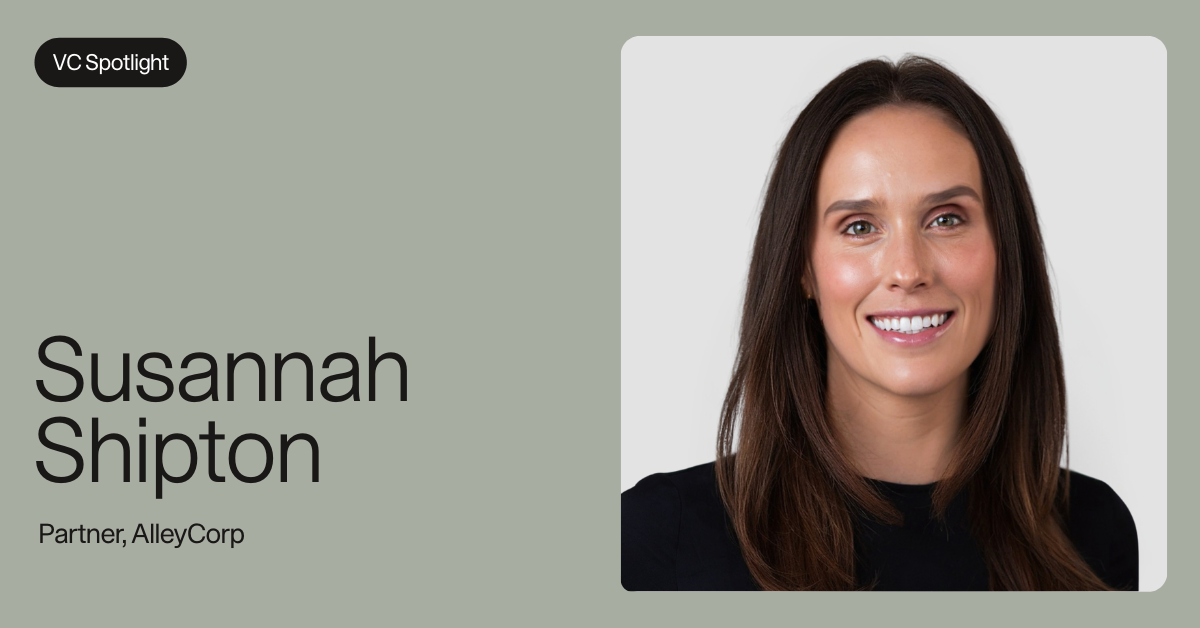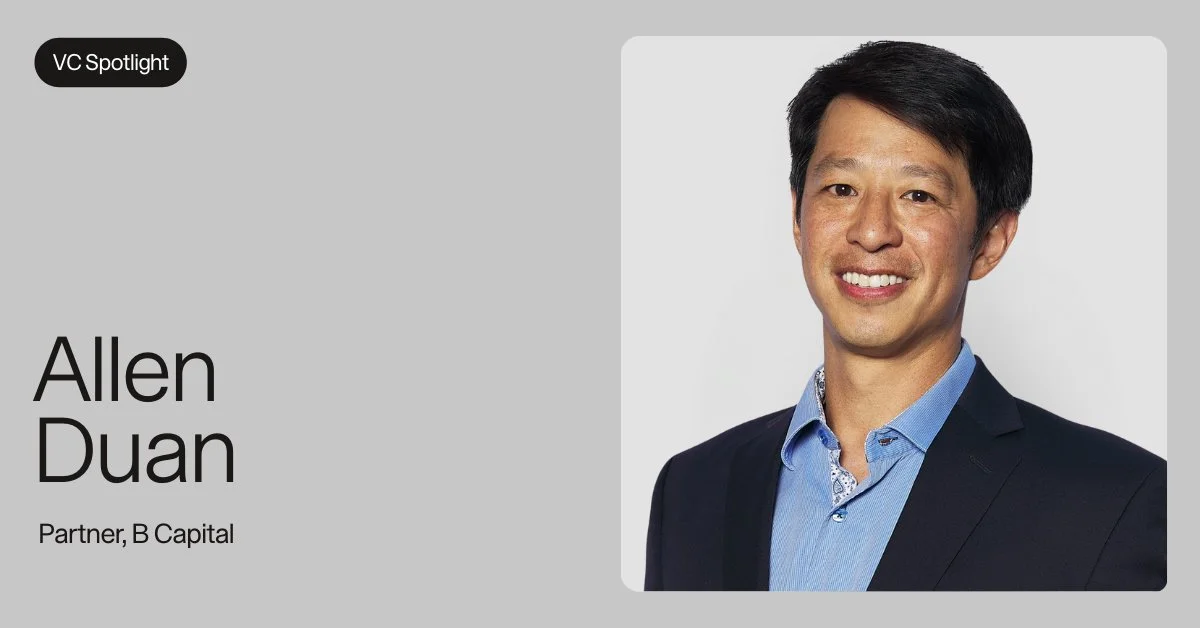VC Spotlight: Amanda Eilian, Founding Partner, Able Partners
Amanda Eilian, Founding Partner at Able Partners, didn’t plan on becoming a venture capitalist.
But after years of “trying just about everything else in finance,” she caught the entrepreneurial bug, cofounded an enterprise software company, and realized that her passion was helping other early stage founders on their startup journeys.
Able partners with companies that are narrowing the “Wellness Gap,” or the growing difference between rising economic measures like GDP and the declining or stagnant trends in people’s overall health and wellbeing. But how is Amanda able to differentiate the startups with real potential for impact versus the ones that may just be riding the wellness trend?
We caught up with Amanda to discuss her career, what she looks for in founders, how she identifies the most promising companies working to narrow the Wellness Gap, and much more.
–
Where did your career start?
Amanda: I ended up in venture capital after trying just about everything else in finance. As an international economics major and Truman Scholar, I originally thought I would end up in government. That changed after an internship in Merrill Lynch's Latin American M&A group. I loved the fast pace and steep learning curve, which led me to two years in M&A, before branching out into private equity, a hedge fund, and even cofounding my own SPAC back in 2007 (before it was cool!) that created a residential mortgage REIT (NYSE:TWO).
Eventually I caught the entrepreneurial bug and co-founded an enterprise software company, which we scaled and sold to Squarespace. At that point, I realized that my real passion was helping early stage founders and ideas get to market. My experience as an operator deeply informs the way I approach investing today.
You founded Able Partners in 2017 — what was the catalyst?
My cofounder Lisa Blau and I had been angel investing for several years when we noticed a persistent “Wellness Gap” — GDP was climbing while physical and mental health were getting worse. We had conviction that consumer behavior was undergoing a long-term shift toward better-for-you products and services, yet the institutional finance community still didn’t see “wellness” as investable. We launched Able with the belief that a proactive approach to health wasn’t a trend but a new standard of living. A few years later, we were fortunate to be joined by our third partner, Alison Ryu, who leads our West Coast efforts.
What stage do you invest at and what’s your average check size?
We invest out of an evergreen fund and primarily focus on Seed and Series A rounds. Our fund structure gives us flexibility, so while most of our capital is deployed at these stages, we can also be opportunistic at the pre-seed when we see an exceptional team or vision taking shape. Our initial checks typically range from $300K–$1M, with capacity to follow on as companies scale.
We focus on the early stage because this is where we can have the most outsized impact — rolling up our sleeves alongside founders to refine their product, validate distribution strategies, and build the foundation for sustainable growth. For us, it’s about being a thought partner through the messy, formative stages of company building.
As a founding partner, what’s been the most unexpected lesson about building a VC firm from scratch?
One of the biggest surprises has been how entrepreneurial the process of building a VC firm really is. Just like the founders we invest in, we had to start with a blank page and define our vision, build our culture, and carve out a differentiated position in a competitive market.
What I didn’t fully anticipate was how much of the work goes beyond investing itself. Developing our theses, earning the trust of entrepreneurs, building a brand that resonates, and cultivating a network of advisors and co-investors all require the same hustle, resilience, and creativity as any startup.
What are the key traits or signals you look for in founders and early-stage startups that make you confident to invest, beyond just the idea, business model, or market size?
Authentic founder/problem fit — a deep, personal connection to the problem being solved.
Clarity of vision paired with adaptability.
Ability to attract and retain top talent.
A track record of grit and persistence, whether in prior professional success, sports, military, personal challenges, etc.
Strong unit economics in consumer-facing businesses (CAC, retention, willingness to pay).
Differentiated go-to-market strategies (e.g., veterinarians, school systems, community-based channels).
Able partners with companies that are narrowing the Wellness Gap. When looking at companies addressing this gap, what differentiates a startup with real potential for impact from one that may just be riding the wellness trend?
For us, it starts with substance over hype. The most promising companies are grounded in science and validated data, which builds trust and staying power. We’re also drawn to founders with an authentic connection to the problem and the ability to inspire real, lasting behavior change in their customers.
Just as importantly, we aim to back businesses that have the ability to move beyond a narrow, affluent early adopter community and serve a broader population by increasing accessibility. Those are the kinds of businesses that have the power to scale and close the Wellness Gap.
What’s the most common mistake you see founders make when pitching to investors?
Founders sometimes are so focused on their vision that they haven't grounded it in realistic unit economics and reasonable growth assumptions. We love "informed" enthusiasm, but passion without a data-driven plan can be a red flag.
What’s an investment from the last 12 months you’re especially excited about?
We’re very excited about SuppCo, a platform that helps consumers manage and optimize their supplement routines. What drew us in is the combination of scientific rigor with consumer-friendly product design: an independent quality-rating system and personalized “StackScore” translate evidence and label data into clear, actionable guidance.
Their testing recently found that several bestselling ‘creatine’ gummies had exactly zero creatine — proof beats packaging. SuppCo fits our mandate to narrow the Wellness Gap by giving consumers credible, easy-to-use tools at the moment of choice, and the early consumer reception has been outstanding.
What are some of the top resources you recommend for founders starting out?
The best resource is other founders who are just a little further along, usually 12 to 18 months ahead. Their lessons are fresh and directly applicable. We know that many of the founders that we invest in get excited about the access they will have to our broader portfolio, and the learnings that come from the companies that are just a step ahead.
eyond that, communities like Tech:NYC provide great peer connections and support. And never hesitate to ask for help — entrepreneurship can often feel lonely, but there’s always someone willing to share their learnings.
What’s your favorite or most frequently used AI tool?
Beyond the obvious ChatGPT/Claude/Gemini (wired to our private knowledge base) for everything (and they do get a lot of mileage!), we're currently refining proprietary AI work flows to source and evaluate based on our very specific point of view. I love using Granola to capture and organize insights from meetings, so I can spend more time thinking than typing. And Consensus is excellent for reviewing scientific and clinical evidence.
You have a founder or LP in from out of town… where are you taking them?
Walk-and-talk on Hudson River Park, with a stop at Little Island to show off the incredible engineering.
Choose one: power breakfast, power lunch, or work dinner. Where?
Breakfast at The Elk, getting some morning sunlight in their outdoor seating.
And finally… what’s the best slice of pizza in NYC?
I've had a gluten allergy for two decades so my recommendations will never be as good as the real thing, but Eataly's gluten free pizza is pretty close. For a local neighborhood option, Wild has a wide selection of GF pizza and pasta.












